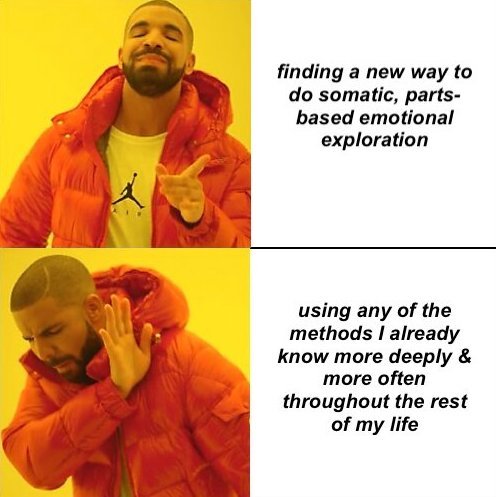You can’t fly halfway to Hawaii
I once heard a researcher talking about a therapeutic dietary approach for seizures, and he said it’s not a diet you can do half-way. It won’t work unless you do the diet 100%. “You can’t fly half way to Hawaii,” he said.
I was reminded of this quote when I saw this meme a while back. I saved it because it captures something I’ve noticed in my IFS coaching practice: the clients who dive deeply into Internal Family Systems (and not just with my coaching, but with books, podcasts, workshops, and in their own daily practice) find their lives transformed.
Others will dip in and want to add IFS to their already full toolbox of emotional healing ideas and practices. We’ll have a few coaching sessions, learn how to connect with mangers, touch in on some tender exiles, and then they’re off to another modality.
In the world of emotional healing and psychotherapy, this is totally normal. People get “tools” from various modalities and use them as needed. But I’ve noticed that IFS isn’t particularly effective as a “tool” amongst other tools. IFS doesn’t really work that well if on one day we approach our inner world as a system of sentient parts held by an expansive Core Self and then on another day approach our inner world as the product of nervous system dysregulation or monkey mind chatter or attachment wounds or maladaptive cognitive projections.
It’s not that the latter approaches are wrong. It’s just that they’re incomplete and provide us with much smaller maps of our inner world than IFS. And if we try to simply piece the maps together, we end up confused and disoriented.
If, however, we take the map of IFS as our central orientation, dive deeply into it, learn it, and let it permeate our lives, then we can begin to add these other approaches within it.
I’ve found that IFS can contain all the other modalities but the reverse is not true. Just to take the examples I gave above, from an IFS perspective:
Nervous system dysregulation starts with dysregulated parts, thus we need to go to the parts.
Monkey mind chatter comes from parts either trying to get our attention or trying to pull our attention away from discomfort; it’s best to go to the chatter rather than ignore it.
Attachment wounds are real but they’re carried by young, exiled parts of you and are protected by serious managers; these wounds are not destiny, they can be healed, and YOU are the only one who can heal them.
Maladaptive cognitive strategies are actually quite rational when seen from the perspective of the entire system of exile, manager, and firefighter parts; forcing change without going to all the parts doesn’t actually heal anything.
From my experience, it pays off big time to let the other modalities go for a while and fly all the way to the land of IFS.
